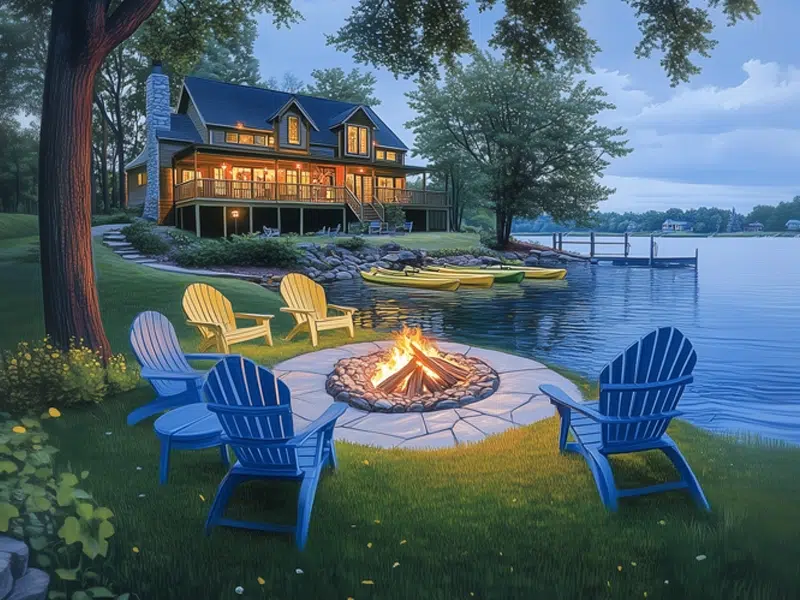Missouri Airbnb Laws – Everything You Need to Know About MO STR Regulations
Since the explosion of short-term rentals in recent years, municipalities have sought to bring new Airbnb laws and regulations. Some of Missouri’s Airbnb laws are now requiring permits, liability insurance, and property requirements. It’s important for vacation rental owners and hosts to know the ins and outs of these regulations.
If you’re a Missouri host with questions about your insurance, Proper is here to help. Our agents understand the specific needs of short-term rentals in Missouri and can walk you through a quick review to make sure your coverage meets local regulations and protects your property’s specific risks.
Don’t wait until an incident to find out you’ve been paying for the wrong insurance. Schedule a consultation to verify your insurance at a time that works for you or call 888-631-6680 today to get peace of mind.

Jefferson City, Missouri, Airbnb Rules
Airbnb Laws in Missouri’s Capitol City
In 2019 lawmakers in Jefferson City, Missouri, relaxed Airbnb Laws to better accommodate the growing industry. Previously, hosts in the city found they were missing out on the nearby areas, particularly Columbia. In order to operate, short-term rental owners need to be aware of the requirements for the city permit application and the requirements of the property in question. These include:
- Licensing: A short-term rental license is required to operate.
- Usage Restrictions: The property shall not be rented or used for receptions, parties, weddings, or similar activities.
- Occupancy Limits: No more than 5 unrelated persons or any number of persons related by blood, marriage, or adoption are permitted.
- Parking: Two on-site parking spots are required where on-street parking is permitted. 3 on-site parking spots if there is no street parking available
- Signage: One sign of a maximum size of one square foot, attached to the exterior of the short-term rental is permitted. This sign cannot be lighted or accompanied by any other displays.
Kansas City, Missouri, Airbnb Regulations
K.C. Enacts Short-Term Rental Laws Requiring Liability Insurance
Hosts in Kansas City must provide proof of liability insurance to the city planning and development director when applying for a permit.
The City spent several years studying how to balance the rights of property owners and neighbors alike, to rent their properties, and preserve the character of their neighborhood. Kansas City defines short-term rentals as rentals for a period of fewer than 30 days. Read more about Kansas City’s short-term rental application process on their website.
In addition to this insurance requirement, hosts are required to apply for and receive a permit from the city in order to operate. One key part of this application is the Neighborhood Notice form, which must be sent to all abutting and nearby neighbors that may be affected by the operation of a short-term rental. A least 55% of neighbors must support the operation.
Other regulations and application requirements include:
- Owner’s affidavit
- Airbnb or Vrbo links to the property where it is advertised
- City inspection of the property
- Payment of all taxes on property
- A map posted inside the short-term rental detailing at least two escape paths for guests
- Insurance Requirements: Evidence of a liability insurance policy of at least $300,000
While the City Requires $300,000 in liability insurance, this can often be insufficient to protect short-term rental owners. The primary reason for an insurance requirement is to ensure that short-term rental owners are properly protected from injuries or property damage and that’s why it’s crucial that your policy is tailored to short-term rentals. Unfortunately, most short-term rental owners carry $300,000-$500,000 in liability coverage, which is not enough. At Proper Insurance, we provide our clients with $1,000,000 in commercial general liability per occurrence with a $2,000,000 per occurrence option. Not only would our policy meet the new insurance requirement, but it would also correctly cover you and your rental business if something were to happen.
Lake Ozark, Missouri, STR Regulations
New Pending Airbnb Laws
The City of Lake Ozark is considering new Airbnb laws for hosts, which may include a registration process. The primary goal of the registration process would be to establish ground rules for hosts to protect them and surrounding neighbors and would also help differentiate unauthorized rentals – those located in zoning districts prohibiting short-term rentals.
“Rental properties are allowed in established Multi-Family Districts (R-3), Commercial Districts (C-2), and Lake Front Mixed-Use Districts. They are not allowed in Single-Family Residential Districts (R-1 and R-2), which is where most family and private residences are located.”
The city is still deciding whether to run the registration in-house or work with a third-party company that would collect license and permit fees. As the most recent updates were from the beginning of October, it may take time to finalize definite short-term rental laws.
St. Louis, Missouri Short-Term Rental Laws
STR Regulations & Airbnb Laws in STL
As of November 6th, 2024, St. Louis, Missouri, has implemented new regulations and new applications for short-term rentals in an effort to promote public safety, maintain community peace and protect neighborhoods. “Short-term rentals are welcome in the City of St. Louis, but the lack of regulation has created serious safety concerns within our neighborhoods,” said Mayor Tishaura O. Jones.
The following regulations are in place:
- Length of Stay: Minimum stay is two nights.
- Neighborhood Peace: Must use best efforts to ensure peace and quiet in neighborhoods.
- Occupancy: Ensure that the amount of people allowed to stay at a short-term rental do not exceed the occupancy limit.
- Taxes: Must be in good standing with the local government.
- House Rules: House rules must be posted inside of the Airbnb.
- Point of Contact: Must have someone available 24/7 who can address concerns.
- More Information: To learn more about local regulations visit the STLOUIS-MO Government website.
St. Charles, MO, Airbnb Laws
Rental Moratorium Enacted Until June 2025
St. Charles, MO, has introduced a moratorium on new short-term rentals in residential zones, set to last until mid-2025, per Ordinance 24-085. Additional regulations include annual permit and inspection requirements, strict noise and parking policies, and a buffer zone between properties. Meanwhile, rentals in commercial zones face fewer restrictions but must remain within designated areas, ensuring a balance between supporting hosts and preserving neighborhood integrity.
- Moratorium: A moratorium on new short-term rentals in residential zones is in effect from June 15, 2024, to June 15, 2025. This does not affect commercially zoned properties in the Extended Historic Preservation District.
- Permit Requirements: All short-term rentals must have an approved permit, renewed with an annual safety inspection.
- Licensing Cap: The number of short-term rentals in residential zones is capped at 0.5% of the city’s total housing units, based on the latest decennial census.
- Zoning: Rentals must be 500 feet apart in residential zones.
- Occupancy: Rentals are limited to the primary structure.
- Parking: One off-street parking space is required per bedroom.
- Noise: No amplified sound is allowed outside between 10:00 p.m. and 10:00 a.m., and a noise monitoring device is mandatory. Learn more about smart devices for your Airbnb.
- Commercial Zones: Rentals in commercial zones do not require a Conditional Use Permit but must be located within the Extended Historic Preservation District.
- Interactive Map: An online map of St. Charles STRs tracks approved and pending rentals, helps verify compliance, and allows reporting of illegal operations.
Verify Your Short-Term Rental Insurance
Interested in a policy to protect you and your business from liability and damage claims? Proper Insurance is the nation’s leading short-term rental insurance provider, protecting homes in all 50 states and replacing inadequate Homeowners and Landlord policies with far superior coverage for the actual risks you face as a vacation rental owner and host.
Proper Insurance’s comprehensive coverage meets or exceeds standard short-term rental requirements with $1M Commercial Liability (CGL) and unmatched protection for your property and revenue. Additional custom coverages include guest-caused theft/damage, amenity liability (bikes, kayaks, hot tub, etc.), bed bugs, fleas, squatters, and more.
Please note: The information provided is intended as a guide and may not be comprehensive or current. Regulations may change and could vary by area or situation. Always consult local authorities or a legal professional to ensure you have the most accurate information for your short-term rental property.



